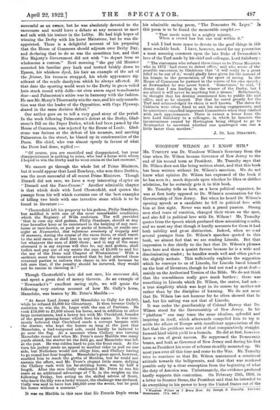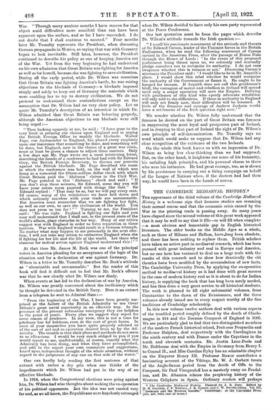WOODROW WILSON AS I KNOW HIM.* MR. TIIMULTY was Dr.
Woodrow Wilson's Secretary from the time when Dr. Wilson became Governor of New Jersey to the end of his second term as President. Mr. Tumulty says that Dr. Wilson does not like being written about, and that this book has been written without Dr. Wilson's sanction. We do not know what opinion Dr. Wilson has expressed of the book if he has seen it ; much depends upon whether he likes or dislikes adulation, for he certainly gets it in this book.
Mr. Tumulty tells us how, as a keen political organizer, he was at first hotly opposed to Dr. Wilson's nomination for the Governorship of New Jersey. But when he heard Dr. Wilson's opening speech as a candidate he fell in political love with him at first sight. Never was such a grand passion. Strong men shed tears of emotion, changed their views on the spot, and also fell in political love with Dr. Wilson ! Mr. Tumulty quotes from the speech which produced these astonishing results, and we must say that though it hardly accounts for them it had both nobility and great distinction. Indeed, when we read several passages from Dr. Wilson's speeches quoted in this book, we almost feel that we are reading Lincoln. But that impression is due chiefly to the fact that Dr. Wilson's phrases have here and there a quaint flavour because he is a wide and discriminating reader ; he handles words well and often prefers the slightly archaic. This sufficiently explains the suggestion which he conveys to us of Lincoln, for Lincoln based himself on the best of literature, though he had not read a great deal— mainly on the Authorized Version of the Bible. We do not think that the resemblance really goes much further ; there was something in Lincoln which Dr. Wilson, the orator, had not— a true simplicity which was kept in its course by mother-wit rather than by the discipline of learning. We do not mean that Dr. Wilson has not humour for he often showed that he had, but his salting was not that of Lincoln.
It was under the guardianship of Colonel Harvey that Dr. Wilson stood for the Governorship of New Jersey. In his " platform " one may trace the same idealism, splendid and inspiring in itself, which afterwards compelled him to try to settle the affairs of Europe with insufficient appreciation of the fact that the problems were not of that comparatively straight- forward kind 'which yield to a formula. He did at first, however, have a run of great success. He suppressed the Democratic bosses, and both as Governor of New Jersey and during his first term as President his score of reforms steadily mounted up. We must pass over all this time and come to the War. Mr. Tumulty tries to convince us that Dr. Wilson maintained a consistent attitude towards the belligerents, and that that was rendered possible only by a clear conception from the beginning of what the duty of America was. Unfortunately, the evidence produced hardly supports this contention. On February 25th, 1916, in a letter to Senator Stone, the President said that he intended to do everything in his power to keep the United States out of the • Woodrow Wi:son as I Snow Ilan. By Joseph P. Tumulty. London: Balnainann. 121s. net.) War. "Through many anxious months I have striven for that object amid difficulties more manifold than can have been apparent upon the surface, and so far I have succeeded. I do not doubt that I shall continue to succeed." Four months later Mr. Tumulty represents the President, when discussing German propaganda in Mexico, as saying that war with Germany began to look inevitable. Still later, however, the President continued to describe his policy as one of keeping America out of the War. Yet from the very beginning he had understood on his own admission that Great Britain was fighting for America as well as for herself, because she was fighting to save civilization. During all the early period, while Dr. Wilson was conscious that Great Britain was fighting America's battle, he was raising objections to the blockade of Germany—a blockade imposed simply and solely to keep out of Germany the materials which were enabling her to try to destroy civilization. We do not pretend to understand these contradictions except on the assumption that Dr. Wilson had no very clear policy. Let us quote Mr. Tumulty's description of an interview in which Dr. Wilson admitted that Great Britain was behaving properly, although the American objections to our blockade were still being urged :- "Then looking squarely at me, ho said : ' I have gone to the very limit in pressing our claims upon England and in urging the British Foreign Office to - modify the blockade. Walter Page, our Ambassador to England, has placed every emphasis upon our insistence that something be done, and something will be done, but England, now in the throes of a great war crisis, must at least be given a chance to adjust these matters. Only a fow days ago Mr. Page wrote me a most interesting letter, describing the details of a conference ho had had with Sir Edward Grey, the British Foreign Secretary, to discuss our protests against the British blockade. Mr. Page described the room in which the conference was held, on the wall of which was hung as a memorial the fifteen-million dollar cheek with which Great Britain paid the Alabama' claims in the Civil War. Mr. Page pointed to this ' Alabama ' check and said : " If you don't stop these seizures, Sir Edward, some day you will have your entire room papered with things like that." Sir Edward replied : " That may be so, but we will pay every cent. Of course, many of the restrictions we have laid down and which seriously interfere with your trade are unreasonable. But America must remember that we ass fighting her fight, as well as our own, to save the civilization of the world. You dare not press us too far ! " ' Turning to me, the President said : He was right. England is fighting our fight and you may well understand that I shall not, in the present state of the world's affairs, place obstacles in her way. Many of our critics suggest war with England in order to foree reparation in these matters. War with England would result in a German triumph. No matter what may happen to me personally in the next elec- tion, I will not take any action to embarrass England when she if fighting for her life and the life of the world. Let those who clamour for radical action against England understand this ! ' " At that time Mr. James M. Beck was one of the principal voices in America pleading for an acceptance of the logic of the situation and for a declaration of: war against Germany. Dr. Wilson in a letter to Mr. Tumulty describes Mr. Beck's attitude as " abominable and unreasonable." But the reader of this book will find it difficult not to feel that Mr. Beck's offence was that he saw clearly what Dr. Wilson saw dimly.
When events at last led to the declaration of war by America, Dr. Wilson was greatly concerned about the inefficiency which he thought he detected in the British Navy. Here is an extract from a telegram he sent to Admiral Sims:
" From the beginning of the War, I have been greatly sur- prised at the failure of the British Admiralty to use Great Britain's great naval superiority in an effective way. In the presence of the present submarine emergency they are helpless to the point of panic. Every plan we suggest they reject for some reason of prudence. In my view, this is not a time for prudence but for boldness, even at the cost of great losses. In most of your despatches you have quite properly advised us of the sort of aid and co-operation desired from us by the Ad- miralty. The trouble is that their plans and methods do not seem to us efficacious. I would be very much obliged to you if you would report to me, confidentially, of course, exactly what the Admiralty has been doing, and what they have accomplished, and add to the report your own comments and suggestions, based upon independent thought of the whole situation, without regard to the judgments of any one on that side of the water."
One can hardly help reading the first sentence of that extract with rather a dry grin when one thinks of the impediments which Dr. Wilson had put in the way of an effective blockade.
In 1918, when the Congressional elections were going against him, Dr. Wilson had wise thoughts about seeking the co-operation of his political opponents. Not the idea was not carried very far and, as we all know, the Republicans were hopelessly estranged when Dr. Wilson decided to have only his own party represented at the Peace Conference.
Our last quotation must be from the pages which describe Dr. Wilson's attitude towards the Irish question :- " I recall his passionate resentment of the attitude and threats of Sir Edward Carson, leader of the Unionist forces in the British
Parliament, when he read the following statement of Carson carried in tho American Press, after the passage of Home Rule through the House of Lords : In the event of this proposed parliament being thrust upon us, we solemnly and mutually pledge ourselves not to recognize its authority. I do not care twopence whether this is treason or not.' Discussing Carson's utterance the President said : I would like to be in Mr. Asquith's place. I would show this rebel whether he would recognize the authority of the Government or flaunt it. He ought to be hanged for treason. If Asquith does not call this gentleman's bluff, the contagion of unrest and rebellion in Ireland will spread until only a major operation will save the Empire. Dallying with gentlemen of this kind who openly advocate revolution will only add to the difficulties. If those in authority in England will only act firmly now, their difficulties will be lessened. A little of the firmness and courage of Andrew Jackson would force a settlement of the Irish question right now.' " We wonder whether Dr. Wilson fully understood that the firmness he desired on the part of Great Britain was firmness in suppressing the most loyal and prosperous part of Ireland, and in denying to that part of Ireland the right of Dr. Wilson's own principle of self-determination. Mr. Tumulty says no word which would make us suppose that Dr. Wilson had any clear recognition of the existence of the two Irelands.
On the whole this book leaves us with an impression of Dr. Wilson as being less clear-thinking than we had supposed. But, on the other hand, it heightens our sense of his humanity, his unfailing high principles, and his personal charm to those who were his intimates. He had great courage, too, as is shown by his persistence in carrying out a tiring campaign on behalf of the League of Nations when, if the doctors had had their way, he would have been in the hands of nurses.



































 Previous page
Previous page